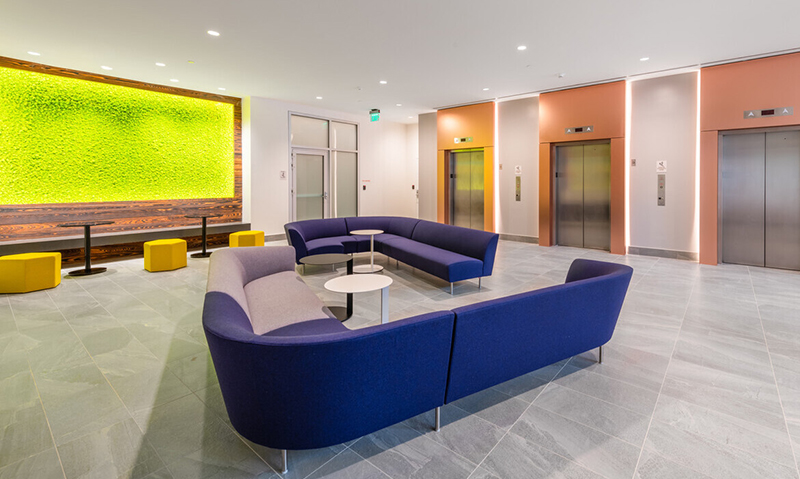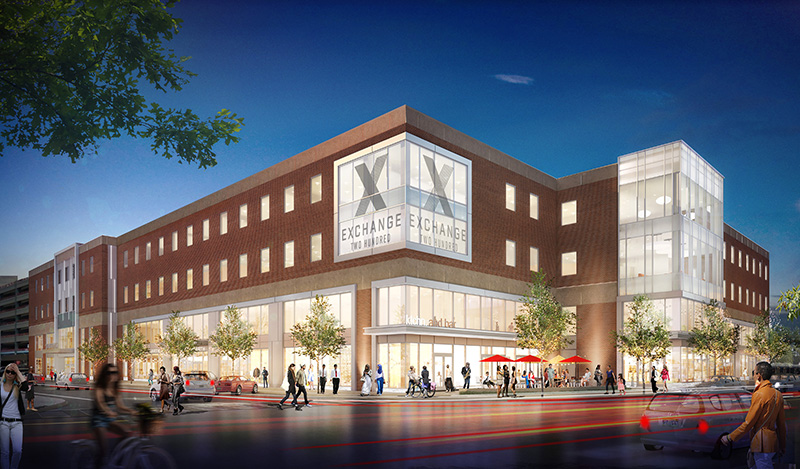
Boston, MA Real estate developer Berkeley Investments has confirmed that its comprehensive redevelopment of Exchange 200, a four-story, 310,000 s/f mixed-use building, is now complete. Working closely with the city, architectural firm Stantec, and builder Dellbrook JKS, Berkeley has transformed the transit-oriented property, directly across from the Malden Center MBTA station, into a modern innovation hub that is ready to accommodate a wide variety of lab, R&D/flex, and office users.
In particular, this redevelopment positions the property to provide modern lab space to the life sciences sector, which continues to experience growing demand for space. “The life sciences market in greater Boston continues to be one of our strongest sectors, and we continue to see demand for lab space that outweighs supply, especially in urban locations directly across the street from the T/commuter rail like Exchange 200,” said Molly Heath, managing director for JLL, which is serving as the exclusive leasing broker for the office, flex, and lab components of the project. “In addition, Malden has a young, educated population, many of whom already commute to East Cambridge or Boston for work.”
Mayor Gary Christenson said, “I could not be more pleased with the exterior renovations of Exchange 200 and I thank Berkeley Investments for their vision and efforts. Our team continues to work hard to create employment opportunities in the life sciences for our residents and I have no doubt that some of the best companies in the region will be clamoring to lease space in this building.”
Berkeley’s investment in the property, which previously served as a bank operations center, include a complete replacement of all systems with advanced new HVAC and mechanical infrastructure, a new façade of floor-to-ceiling glass, a new two-story atrium lobby, and adding an assortment of new amenities including fitness center, locker room/showers, and bike storage. In addition, Exchange 200 offers a number of unique features that will appeal to prospective life sciences and lab tenants, especially for a building that’s across the street from public transit, a short bike ride to Cambridge, and less than 15 minutes from downtown Boston. According to Dan McGrath, Berkeley’s senior vice president and director of asset management, these include “large, flexible floor plates, high-capacity power infrastructure, the option of having redundant power, high ceilings, heavy floor load capacities, and six loading docks with secure, private load-in.”

The redevelopment of Exchange 200 also includes the creation of new street-level retail by replacing an uninviting brick façade with floor-to-ceiling glass storefronts, offering nearly 15,000 s/f of new retail space. To date, Berkeley has signed leases with European coffeehouse Caffè Nero, as well as restaurants 110 Grill and Evviva Trattoria, to occupy space on the ground floor, which will also include outdoor patio space. These retail spaces will serve not only as amenities for the building’s occupants but will also add to the dynamic urban environment that continues to grow.
McGrath predicts that Exchange 200 will appeal to an assortment of other companies like tech-start-ups, robotics, health-care and non-profit office tenants who are looking to engage with a talented, transit-oriented workforce but who may have space and infrastructure requirements that are more typical of suburban locations.
“Exchange 200 provides these characteristics in close proximity to the urban core, with extensive transit options in the form of the Orange Line, commuter rail, and bus service, but at a significant value compared to the rents companies will face in Boston or Cambridge,” said McGrath.
“We’re incredibly excited to launch the new Exchange 200 to the market. The building’s amenities and its desirable location across the street from the MBTA Orange Line will be a huge draw for forward-thinking, creative companies who crave a dynamic urban experience.”
.png)






